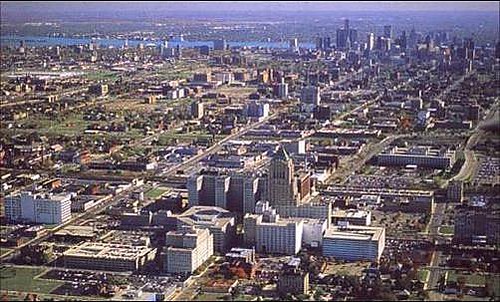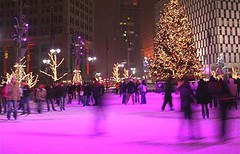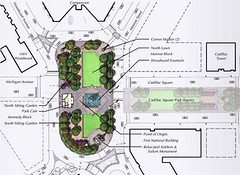Is Detroit (the city) a lost cause environmentally? Altogether?

Posted June 11, 2009 at 1:28PM
I hope that, by the end of this week, Red Wings fans are celebrating, and that's nothing against Pittsburgh, a fine city with fine people, at least the ones I know. But Pittsburgh already has a professional sports champion this year, the Steelers having won the Super Bowl, and Detroit has had nothing but misfortune and bad publicity. As the opening photographs with this post illustrate all too well, the Motor City needs a boost. Badly.
If you're reading this blog at all, chances are that you already know how important central cities and their downtowns are to long-term environmental sustainability. Urban flight and suburban sprawl may be just about the worst things that happened to our country's environment (not to mention the economy and social fabric) in the late 20th century, and no city suffered worse from them than Detroit. But is the city too far gone for a recovery?
Neil Takemoto writes in a series of posts on CoolTown Studios (here, here, and here) that the answer is no, and that one of the keys may be to focus on urban placemaking to attract the creative class. His favorite example, and it certainly appears to be a good one, is the city's new Campus Martius:
"There may not be a lot going right economically in Detroit, but at least in 2001 then Mayor Dennis Archer set a goal of creating the best public space in the world. It resulted in a place for people in the heart of the motor city, Campus Martius, a 1.6-acre urban park that reminds its residents there's more to life than work.
"You can read more about its creation in a previous [CoolTown] entry here back in 2005, but what's happened since its opening in November 2004?
- 2.24 million square feet of new or renovated retail and office space fronting the park.
- Over $450 million in new investments in the area.
- 300 new condos and apartments are planned, which is a big deal when you're talking about downtown Detroit.
- 50,000 ice skaters each winter, plus broomball (hockey with broom-like sticks).
- Home of the annual Motown Winter Blast, an event that draws over 450,000 people to the area."Then there's the outdoor cafe, 2000 informal places to sit, year-round concerts featured on two retractable stages, bocce ball courts, and just a place to feel like a sense of community can rise above all else."
On the National Housing Institute's blog Rooflines, David Holtzman highlights a different, and much more radical, approach:
"Recently a group of planners, including long-time NHI researcher Alan Mallach, visited Detroit to survey the city's vast vacant spaces and make recommendations on how to re-organize the city for the future. The team proposed relocating many of the city's far-flung residents, who live in small, highly distressed residential pockets amid a sea of weedy vacancy, into urban villages (news story here). As these villages are developed, the rest of the city should be designated for agricultural or recreational purposes, they said.
Corridors would connect the urban villages and give residents access to the open spaces.
"The challenges facing shrinking cities like Detroit are fundamentally different from those of thriving cities like Boston, New York and San Francisco. When it comes to green space, Detroit has it in spades, while strong market cities struggle to find places for street trees and grass patches amid oodles of new condo and rental projects.
"By defining the future built-up area of Detroit proper as a series of small urban villages, the planners are talking about a new definition of what a city is. In a place like Detroit, the urban form will exist in two types: the suburbs and the villages . . . Of course, it's hard to say whether the transit network the planners envision to connect the urban villages and the surrounding open spaces would be feasible. Even within the limited space of these villages, some minimum density would be critical. One has to assume as well that there would be equally good transit access to the suburbs, which would presumably still provide home and/or work for a large share of the people in the villages . . ."
Wow. Although intriguing in a utopian sort of way, that sounds like giving up on cities and downtowns altogether in favor of a much more fragmented landscape and pattern of living, resulting in probably even more driving and emissions.


